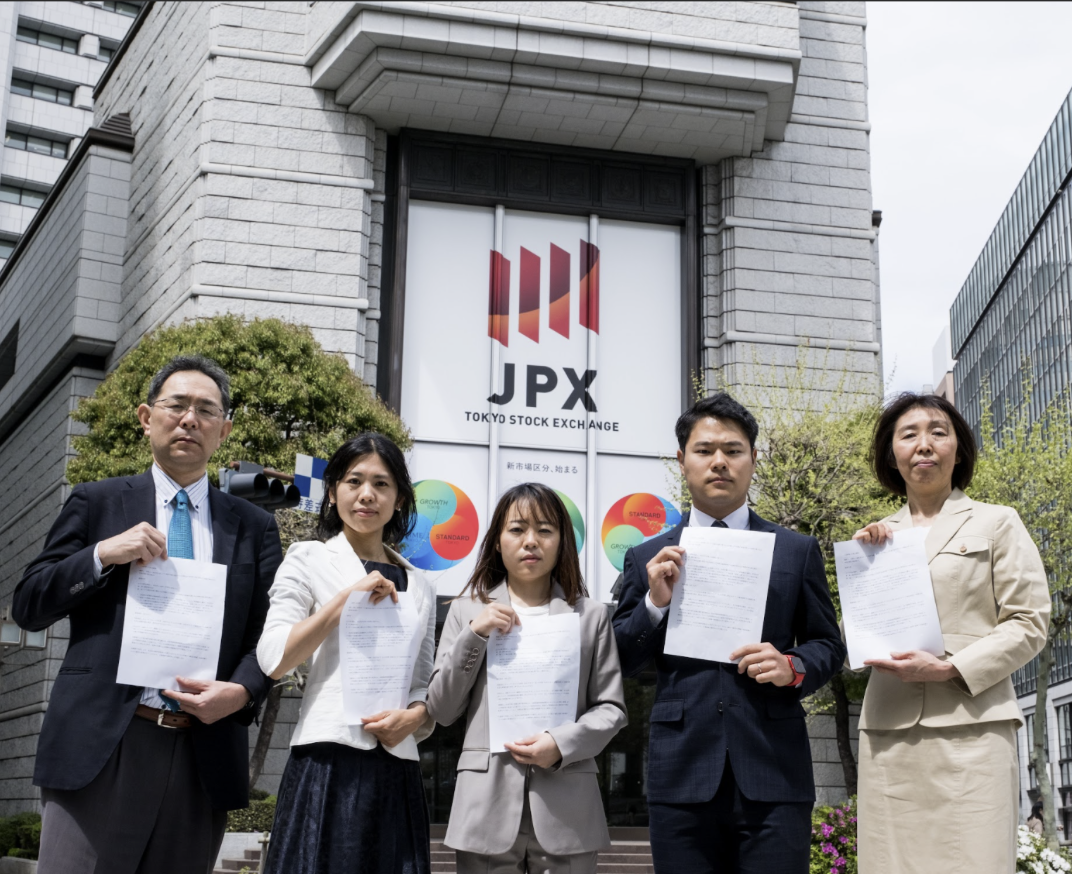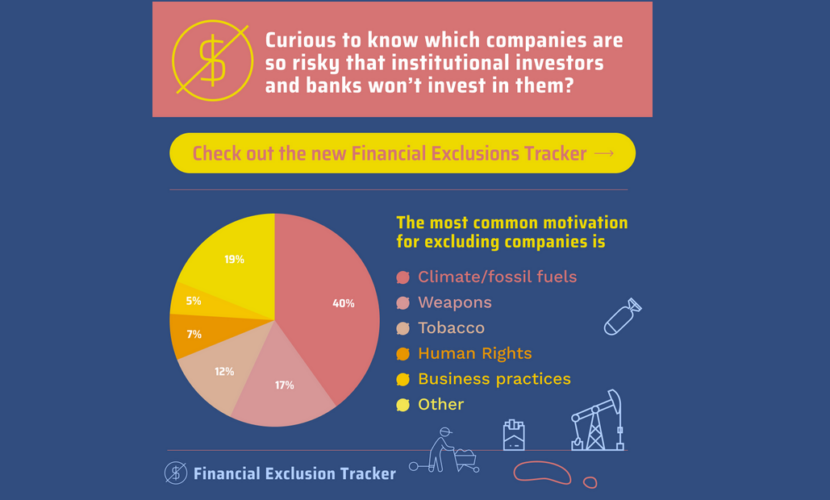最新記事&分析
Six companies in Tokyo Prime Market, including all
3 “Mega-banks” face climate shareholder resolutions

Originally Published in Asia Shareholder Action
Today, climate-related shareholder resolutions have been announced targeting Japan’s largest banks and energy corporations.
A coalition of environment organisations and shareholders have filed the resolutions calling for greater disclosure by the companies on how they will meet their net zero commitments.
Resolutions have been filed to Japanese mega banks, Mitsubishi UFJ Financial Group, Sumitomo Mitsui Financial Group, Mizuho Financial Group, and energy giants: Mitsubishi Corporation, and Tokyo Electric Power Company Holdings (TEPCO) and Chubu Electric Power Co who jointly own JERA, the largest thermal power generator in Japan.
The shareholders include civil society organizations or their representatives, including Market Forces, Friends of the Earth Japan, Kiko Network and Rainforest Action Network.
Shareholder proposals
| Company (Ticker) | Shareholder proposals | Proponents |
| Mitsubishi UFJ FG (8306) | Partial amendment to the Articles of Incorporation (issuing and disclosing a transition plan to align lending and investment portfolios with the Paris Agreement’s 1.5 degree goal requiring net zero emissions by 2050) | RAN Market Forces Kiko Network |
| Sumitomo Mitsui FG (8316) | Partial amendment to the Articles of Incorporation (issuing and disclosing a transition plan to align lending and investment portfolios with the Paris Agreement’s 1.5 degree goal requiring net zero emissions by 2050) | RAN Market Forces Kiko Network |
| Mizuho FG (8411) | Partial amendment to the Articles of Incorporation (issuing and disclosing a transition plan to align lending and investment portfolios with the Paris Agreement’s 1.5 degree goal requiring net zero emissions by 2050) | RAN Market Forces Kiko Network |
| Mitsubishi Corporation (8058) | Proposal 1: Partial amendment to the Articles of Incorporation (adoption and disclosure of short-term and mid-term greenhouse gas emission reduction targets aligned with the goals of the Paris Agreement) Proposal 2: Partial amendment to the Articles of Incorporation (disclosure of how the company evaluates the consistency of each new material capital expenditure with a net zero greenhouse gas emissions by 2050 scenario) | FoE Japan Market Forces |
| Tokyo Electric Power HD (9501) | Partial amendment to the Articles of Incorporation (Alignment of capital allocation with a net zero by 2050 pathway) | Kiko Network Market Forces |
| Chubu Electric Power (9502) | Partial amendment to the Articles of Incorporation (Alignment of capital allocation with a net zero by 2050 pathway) | Kiko Network Market Forces |
The shareholder proposals to these six companies call for them to disclose business plans that include medium-term and short-term greenhouse gas reduction targets consistent with the Paris Agreement goals, and initiatives toward virtually zero (net-zero) carbon emissions by 2050.
The Sixth Synthesis Report released in March by the UN’s Intergovernmental Panel on Climate Change (IPCC) confirmed that in order to limit the temperature increase from pre-industrial times to within 1.5 degrees Celsius, we must reduce 60% of greenhouse gases by 2035 compared to 2019 levels but reduction targets of each country are “too inadequate.”
UN Secretary-General Guterres warned that “the climate time bomb is ticking” and asked advanced countries (including Japan) to reduce greenhouse gas emissions from power generation to virtually zero by 2035.
Some G7 member countries have reportedly opposed Japan’s advocacy of investments in natural gas and the introduction of technologies that will continue to support the use of fossil fuels in the power generation sector, ahead of the G7 summit, to be hosted by Japan in Hiroshima as chair. Government officials including the United States and the United Kingdom, questioned the draft communiqué for next month’s Energy, Climate, and Environment Ministerial Meeting, noting that there is not enough emphasis on efforts to accelerate climate change action.
While the climate change policies of private companies are greatly influenced by the policies of the Japanese government, the industry and companies are required to take their own measures in order to conduct business and gain the trust of the international community.
Especially, companies targeted by our shareholder proposals, the three ‘Mega-banks’, Mitsubishi Corporation, and JERA, owned by TEPCO HD and Chubu, have all been continuing their involvement in expanding the fossil fuel sector both in Japan and abroad. The companies are investing in or financing LNG and ammonia or hydrogen co-firing technology which extends the operational lives of new and planned coal-fired power plants.
The following is a summary of the key issues facing these companies (by industry);
MUFG, SMFG, and Mizuho FG
The megabanks’ climate policies, targets and transition plans lack credibility, as they fail to align with a net zero emissions by 2050 pathways such as the International Energy Agency’s Net Zero Emissions scenario and the Net Zero Banking Alliance (NZBA) which the megabanks are signatories. In particular, megabanks lag far behind their global peers, which have policies to limit support for new oil and gas development projects. To fulfill their own commitments, they must act immediately to set short- and medium-term targets and investment and financing policies that are aligned with their long-term net-zero goal.
— Eri Watanabe, Japan Energy Finance Campaigner of Market Forces
The land-use sector is also important in addressing climate change. The NZBA guidelines call for setting reduction targets for absolute emissions and/or intensity in the agricultural sector, which is considered a carbon-intensive sector, but Japanese megabanks do not. And, despite the greenhouse gas emission factor of woody biomass power plants being higher than that of coal-fired power plants at the time of combustion, CO2 emissions from the combustion of woody biomass fuel are not reported in banks’ financed emissions reporting. It will make it difficult to achieve a transition that limits temperature rise to 1.5°C in the power sector.
— Dr. Toyoyuki Kawakami, Japan Representative, Rainforest Action Network
Mitsubishi Corporation
Mitsubishi Corporation’s current climate targets and disclosures are entirely insufficient for investors to conclude it has a viable pathway to meet its own net zero by 2050 commitment. The company’s monster Scope 3 emissions are larger than either France or the United Kingdom’s annual carbon pollution. Mitsubishi must set Scope 3 emission targets so that investors can see how the company will meet its net zero commitment.
— Meg Fukuzawa, Energy Finance Campaigner, Market Forces
TEPCO HD and Chubu Electric Power
TEPCO Group and Chubu Electric Group, and their most carbon intensive joint venture JERA cannot claim to be net zero companies while continuing to invest in new fossil fuel projects. These companies must show the integrity of their transition plans by aligning the capital allocation with the critical pathway to limit global warming to 1.5 degrees.
— Dr. Sachiko Suzuki, Japan Energy Finance Analyst, Market Forces
JERA, Japan’s largest power generation company, has stated its commitment to a low-carbon society with “Zero CO2 Emissions 2050”. While there are some arguments that it is not easy to switch to sustainable energy from fossil fuel energy in today’s society, companies in the same industry in the U.S. and Europe are steadily moving toward zero emissions as the time limit is coming every minute. If JERA, TEPCO/Chuden continue their strategies, they should make information available to determine the “true” effectiveness of their strategies in an accurate and timely manner.
— Yasuko Suzuki, Program Coordinato, Kiko Network
These companies face rising risks of stranded assets where they need to record impairment loss in the future due to environmental, market, and/or regulatory changes, along with litigation risk and brand value damage.
In the proxy season of 2022, Japanese companies faced a record number of shareholder proposals related to climate change. Proponents of these proposals were not only environmental NGOs but were foreign asset managers and local municipal governments. This reflects that diverse stakeholders are taking action to warn high-emitting companies about the delay in climate change measures. Our proposals to Japanese companies from last year were also widely supported, especially by foreign institutional investors.
We hope that companies will also respond to our shareholder proposals seriously and that investors will understand they aim to increase the company’s shareholder values by helping companies to strengthen their climate measures.








